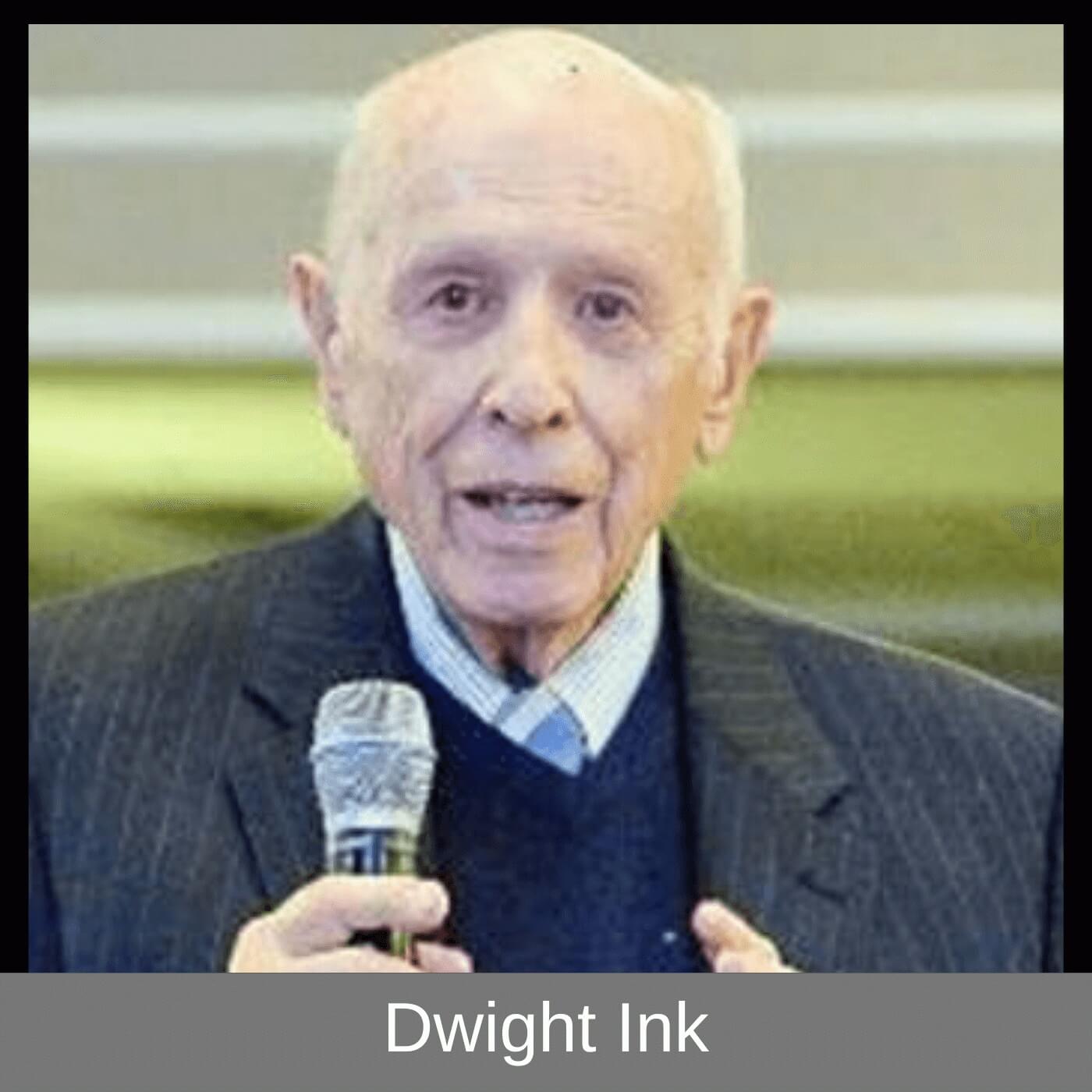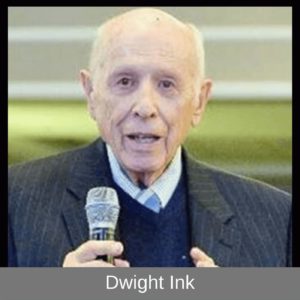
Ep. 40 - Meet Dwight Ink, a 97-year-old activist who has had a fascinating life and one of the best storytellers ever! His government career serving 7 Presidents is magnificent!
Top Takeaways:
-
- How to learn to fight for what is right even when you could possibly lose your job
- From an Iowa farm boy without shoes to a magnificent leader
- The importance and fulfillment of leadership careers
- The importance of a president acting and deciding quickly during a disaster
- How disaster control and management measures from 50 years ago in Alaska can be reapplied to solve today's similar situations
- Talking your way out even when kidnapped in the cocaine fields
LISTEN NOW to one of the best storytellers you will ever hear!
A farm boy, he grew up in Madison County in a poverty-stricken family struggling with the Great Depression and droughts. He found out the true story much later in life about how his family paid for his college education. He received his BA from Iowa State University in 1947, and his M.A. in Public Administration at the University of Minnesota in 1950. The boy who couldn't afford shoes to go to school graduated with a Master's degree and went on to make integrity-founded career choices. He ferreted out corruption in Fargo, changed federal government personnel policies still in effect today as civil service and was kidnapped in the cocaine fields. Dwight's management career spanned the Atomic Energy Commission, the newly formed HUD, the Office of Management and Budget, the Bureau for Latin America and the Caribbean, the Community Services Administration, and the Environmental Protection Agency. He has a long story for a long life, but you won't be disappointed!
He received his BA from Iowa State University in 1947, and his M.A. in Public Administration at the University of Minnesota in 1950. The boy who couldn't afford shoes to go to school graduated with a Master's degree and went on to make integrity-founded career choices. He ferreted out corruption in Fargo, changed federal government personnel policies still in effect today as civil service and was kidnapped in the cocaine fields. Dwight's management career spanned the Atomic Energy Commission, the newly formed HUD, the Office of Management and Budget, the Bureau for Latin America and the Caribbean, the Community Services Administration, and the Environmental Protection Agency. He has a long story for a long life, but you won't be disappointed!
"One thing I've learned that will help you throughout your career is that you may lose your job standing up for integrity and honesty, but in almost all cases you'll move on to greater things."
Dwight began his public service as Budget and Personnel Officer in the City of Fargo where he helped a new city manager install the Manager-Council form of government and drive out the pattern of petty corruption that existed. He then joined the Bureau of Reclamation where he directed a pilot program to divert water from the Missouri River to help water-short municipalities in a five-state area. When the Korean War made it impossible to acquire materials for the dams and diversion canals, he joined the Atomic Energy Commission where he became Control Officer on the "H-Bomb" plant, then the largest and most urgent construction project in the Free World. As part of the AEC's good neighbor program, Mr. Ink was appointed Chair of a City Charter Commission where he secured unanimous consent of both houses of the state legislature to pass a bill to enable small cities in South Carolina to adopt the Council-Manager form of government.
In Washington D.C., Dwight soon became AEC Assistant General Manager where he organized DOD, State Department, AEC joint teams to inspect the adequacy of custodial arrangements for U.S. nuclear weapons in foreign NATO bases. He also initiated discussion of a proposed treaty to ban those nuclear tests for which cheating could be verified. He briefed President Eisenhower on nuclear issues and continued to press the issue under President Kennedy who negotiated such a treaty as the first step toward halting the dangerous race toward larger and more powerful nuclear weapons.
President Johnson appointed Mr. Ink Executive Director of his cabinet level Commission to lead the Alaskan recovery from its devastating 1964 earthquake that threatened to bankrupt the state and most of its residents. He then appointed Mr. Ink as Chair of his Task Force on Education to overhaul the Office of Education, so it was capable of handling the enormous increase in funding and the new Civil Rights role it was to play. He also appointed Ink to chair an interagency Joint Administrative Task Force to cut red tape in his Great Society programs. Finally, he appointed Ink to be HUD's first Assistant Secretary for Administration to help Secretary Weaver organize the Department.
Ink then served as President Nixon's Director of the Office of Executive Management, a semi-independent part of the Bureau of the Budget to provide government-wide leadership for the ambitious management reforms Nixon planned. He led most of the components of Nixon's New Federalism, and provided the lead role in persuading Congress to accept a series of reorganizations, including EPA and OMB. He opposed strongly the 1973 departmental reorganization developed by Ehrlichman and others that bypassed Congress and concentrated power in a group of White House assistants and counsellors.
In 1973 Ink moved to GSA as Deputy Administrator where he halted the actions that were undermining the integrity of the career service and its procurement practices. When the Arab Oil Embargo occurred, President Ford wanted the federal government to set the example for cutting our demand for energy. He put Ink in charge of this project, and in 90 days the government had cut its total demand for energy by one third.
President Carter appointed Ink Executive Director of his civil service reform. The Civil Service Reform Act was based on the recommendations of the task forces he headed. It is the most sweeping set of personnel reforms since the federal civil service was initiated by the 1883 Pendleton Act.
President Reagan appointed Ink Director of the Community Services Administration, with the charge to terminate the agency if Congress agreed, which they did. OB said no independent agency had been eliminated since the Supreme Court declared the NRA unconstitutional in the early 1930's, so Ink had no precedent on which to design the closure process, and he had only seven weeks to complete closure once Congress acted. The close-down succeeded, and Ink then became vice president for management of the U.S. Synthetic Fuels Corporation. After several years he was nominated for a position in USAID. While waiting for confirmation hearings, the White House appointed him Acting Administrator of GSA to clean up some problems. He spent Reagan's second term as Assistant Director of USAID for Latin America and the Caribbean where he directed our technical and economic assistance to countries often beset by civil war and drug cartels.
After Reagan's presidency, Ink served as President of the New York Institute of Public Administration (IPA). The Institute was the early pioneer in the practice of public administration, spawning many other such institutes in the U.S. and abroad. Much of its work under Ink was helping former Soviet countries make the transition from dictatorships to democratic institutions with a market economy. IPA was chosen by the Peoples Republic of China to lead the initial UNDP project to modernize its government personnel system and decentralize its government to a limited extent.
Listen in to hear all the interesting stories that Dwight has lived through and the work he did while in the federal government. This is a "MUST LISTEN."
Key Moments:
He describes his childhood in poverty and the sacrifices his parents made for him [4:46]
He explains how he stood for integrity and the right thing and gained a lifelong career [7:29]
He narrates his role in the Atomic Energy Commission and the challenges he and his team experienced [22:10]
Dwight describes his positions working under different presidents and his opinion about how each performed to better how organizations worked [31:21]
Why he believes that the idea of HUD trying to improve communities was oversold since it did not have the legislative authority to do so. He describes the tasks he performed at the agency [47:35]
He narrates the events that led to his kidnapping in the cocaine fields for being President Reagan's appointee and how he was released the same day [53:20]
He explains how the federal government can handle today's pandemic comparing it to the 1964 Alaska earthquake reconstruction. What he did for the community during that period [1:06:23]
University of Nebraska Public Interest Stories
Visions Across America: Part 1
Dwight Ink on Grand Challenges of Public Administration
